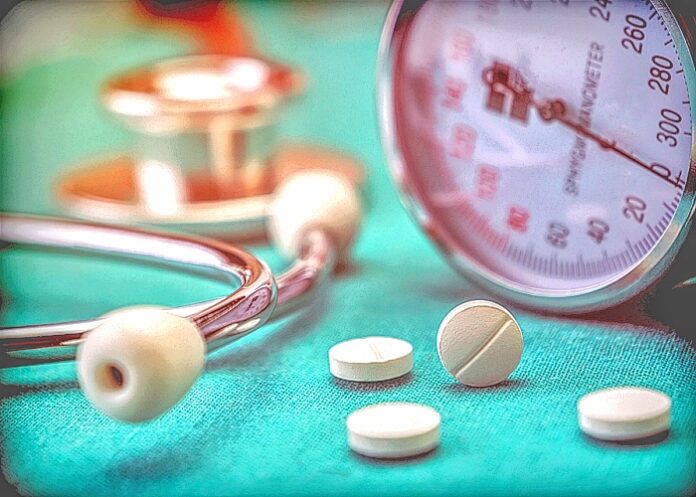Almost a fifth of hypertensive patients may unknowingly be taking medications that raise blood pressure (BP), according to data from the US National Health and Nutrition Examination Survey (NHANES).
Prevalence of such medication use was an overall 14.9% across survey cycles from 2009 to 2018, reaching 18.5% of adults with hypertension, reported Dr Timothy Anderson of Beth Israel Deaconess Medical Center in Boston and colleagues in JAMA Internal Medicine.
BP-raising medications were determined according to the 2017 American College of Cardiology and American Heart Association guidelines. The most common ones taken by NHANES participants were antidepressants (8.7%), prescription nonsteroidal anti-inflammatory drugs (NSAIDs; 6.5%), steroids (1.9%), and oestrogens (1.7%).
“Most US adults with hypertension have not achieved recommended BP targets. One often overlooked barrier to control is iatrogenic, or the medications known to raise BP. Given national trends of increasing polypharmacy, medications that raise BP may contribute to poor BP control rates and also worsen polypharmacy,” the investigators said.
Using these medications has been linked to greater use of anti-hypertensives in people with controlled and uncontrolled hypertension alike. Adults not concurrently taking anti-hypertensives were more likely to have uncontrolled hypertension if they were taking these drugs (OR 1.24, 95% CI 1.08-1.43).
“Many medications known to raise BP have therapeutic alternatives without this adverse effect, for example, acetaminophen in place of NSAIDs and progestin-only or non-hormonal contraceptives in place of ethinyl estradiol-containing contraceptives,” Anderson's group noted.
“Thus, our findings indicate an important opportunity to improve BP control by optimising medication regimens, an approach with the potential to also reduce polypharmacy and medication regimen complexity,” the authors suggested.
“Clinicians caring for patients with hypertension should routinely screen for medications that may cause elevated BP and consider replacing them with safer therapeutic alternatives, and minimising the dose and duration of use when alternatives are not available,” they said.
The cross-sectional study included 27,599 adult participants of NHANES (mean age 46.9; 50.9% women).
Hypertension was defined as systolic BP 130 mm Hg or higher or diastolic 80 mm Hg or higher. The prevalence of hypertension and uncontrolled hypertension were 49.2% and 35.4%, respectively.
Prescription medication use was obtained from home interviews in NHANES.
Anderson and colleagues acknowledged their reliance on self-reported medication use and the lack of data on medication dose, duration, and over-the-counter medication use.
NHANES was the basis of a prior report suggesting a decline in both awareness and control of hypertension in recent years.
Study details
Prevalence of Medications That May Raise Blood Pressure Among Adults With Hypertension in the United States
John Vitarello, 1 Clara Fitzgerald, Jennifer Cluett, Stephen Juraschek, Timothy Anderson,4
Published in JAMA Network on 22 November 2021
The majority of US adults with hypertension have not achieved recommended blood pressure (BP) targets. One often overlooked barrier to control is iatrogenic, the use of medications that are known to raise BP.
Given national trends of increasing polypharmacy, use of medications that raise BP may contribute to poor BP control rates and also worsen polypharmacy.
Thus, in this cross-sectional study, we examined National Health and Nutrition Examination Survey (NHANES) data to characterise the prevalence of use of medications that may raise BP and assess their associations with BP control and antihypertensive use.
MedPage Today article – Nearly 1 in 5 People With Hypertension Take BP-Raising Meds (Open access)
See more from MedicalBrief archives:
New NICE hypertension guidelines a 'pragmatic compromise’ — The Lancet
Many take other drugs that lower effectiveness of BP medications
Combination pill significantly lowers blood pressure
Exercise may lower BP as much as medication– review of 400 trials

